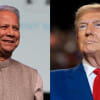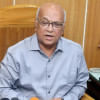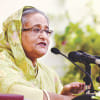The significance of Bangladesh's Independence Day and Victory Day

Independence Day, March 26, is the day that Bangladesh was declared to be an independent, sovereign nation. This marked the beginning of Bangladesh as a nation, at the onset of the Liberation War of 1971. It was declared after the brutal March 25 crackdown of the occupying Pakistani army on innocent civilians.
On the other hand, Victory Day, December 16, is the day the Pakistani military surrendered before the Indian Army and the Mukti Bahini of Bangladesh won the Liberation War.
The two days are different because while we declared independence on March 26, we were still under West Pakistani occupation, and would have to fight them off to free ourselves. On December 16, the country had successfully done so and gained liberation from West Pakistan, and were free to rule our own sovereign state.
Both days are equally important in Bangladesh's history. To understand why, we need to take a closer look at history.
Historical context
In 1947, the Partition of India took place and the subcontinent was divided into India and Pakistan along religious lines. Allotting all Muslim-majority areas to Pakistan led to the state of Pakistan being composed of two provinces - East and West Pakistan, separated by India in between. While most Bangalis - the majority ethnic group in East Pakistan - shared the same religion as that of West Pakistan, they had a different culture and heritage and spoke a different language.
Soon after partition, an economic disparity between the two partys of Pakistan started to take shape, and East Pakistanis faced oppression by the West Pakistani ruling elite. In 1948, the government tried to establish Urdu as the sole state language, which would deny the demand of the people to make Bangla, the mother tongue of the majority in East Pakistan, the state language. The Language Movement, which reached its peak on February 21, 1952, planted the first seeds of the sentiments of a separate Bangali national identity.
March 26: Independence Day
From 1963 till Independence Day in 1971, various political parties, primarily the Awami League, led by Bangabandhu Sheikh Mujibur Rahman, campaigned for regional autonomy of East Pakistan.
In the Pakistani general elections held on December 7, 1970, the Awami League, led by Sheikh Mujib, won 288 seats out of 300 seats in the National Assembly of Pakistan. Despite the overwhelming victory, the Awami League was not allowed to form a government by the Pakistani military administration led by General Yahya Khan. The country erupted in protest at this blatant injustice.
On March 7, 1971, Sheikh Mujibur Rahman made his historic speech at the Ramna Race Course, calling the general populace of East Pakistan to resist the West Pakistani administration. He declared that the Awami League would collect taxes and form committees in every neighbourhood to organise resistance. it was during this speech when he famously said, "this time, the struggle is for our liberation. This time, the struggle is for our independence!"
Weeks of civil disobedience and political instability followed. While the Awami League was increasingly gaining more public support in East Pakistan, West Pakistance was flying troops and arms, preparing for a military crackdown.
On March 25, Yahya Khan declared military action and ordered the Pakistaniarmy to arrest Mujib. The Pakistan Army launched Operation Searchlight and killed thousands of innocent people, set fire to houses, and looted businesses on the night of March 25, 1971.
Before being detained by the Pakistan Army that same night, Sheikh Mujib declared Bangladesh as an indepdendent nation.
Independence Day marks the declaration of our independence and the beginning of a nine-month-long war of liberation till the victory on December 16, 1971. We commemorate the day by observing a public holiday and paying tribute to the millions of martyrs at the National Memorial at Savar.
December 16: Victory Day
On this day, the Pakistani army surrendered, and we won the war. We commemorate the Pakistani Instrument of Surrender, where the commander of the Pakistani Forces, General AAK Niazi, surrendered to Lieutenant General Jagjit Singh Aurora, Joint Commander of Indian and Bangladeshi Forces, at the Ramna Race Course in Dhaka, ending the nine-month Bangladesh Liberation War and genocide of the Bangladeshi people.
This marked the official end of the war and paved the way for the new nation of Bangladesh,
Two days before their surrender, however, on December 14, 1971, the West Pakistani army murdered many intellectuals including university professors, doctors, journalists, writers, politicians, artists, and activists. This was a strategy to stunt the development of our young nation. We observe Martyred Intellectuals Day on December 14 to mourn the assassination of Bangladeshi intellectuals.
The transition to complete victory and peace was not smooth and immediate. Even after the defeat, Pakistani authorities were delaying the release of Sheikh Mujib from solitary confinement in Pakistan, evoking tension, uncertainty, and a sense of incompleteness due to the absence of the leader of the newly liberated nation. Sheikh Mujibur Rahman finally returned to an independent Bangladesh on January 10, 1972, and was engulfed by the embrace of his people.
After nine months of war, the genocide of around three million, displacement of another ten millions, and rape of 200,000 to 400,000 women, victory came at a heavy cost. The struggle was long and haird, marked by many milestones, each with loss of life and immense suffering, which reverberate in the lives of many descendants of our freedom fighters to this day. To pay our proper dues to the independent nation we live in today as citizens, the least we can do is understand and recognise the importance of each milestone leading to our eventual victory and observe the days accordingly.

 For all latest news, follow The Daily Star's Google News channel.
For all latest news, follow The Daily Star's Google News channel. 








Comments